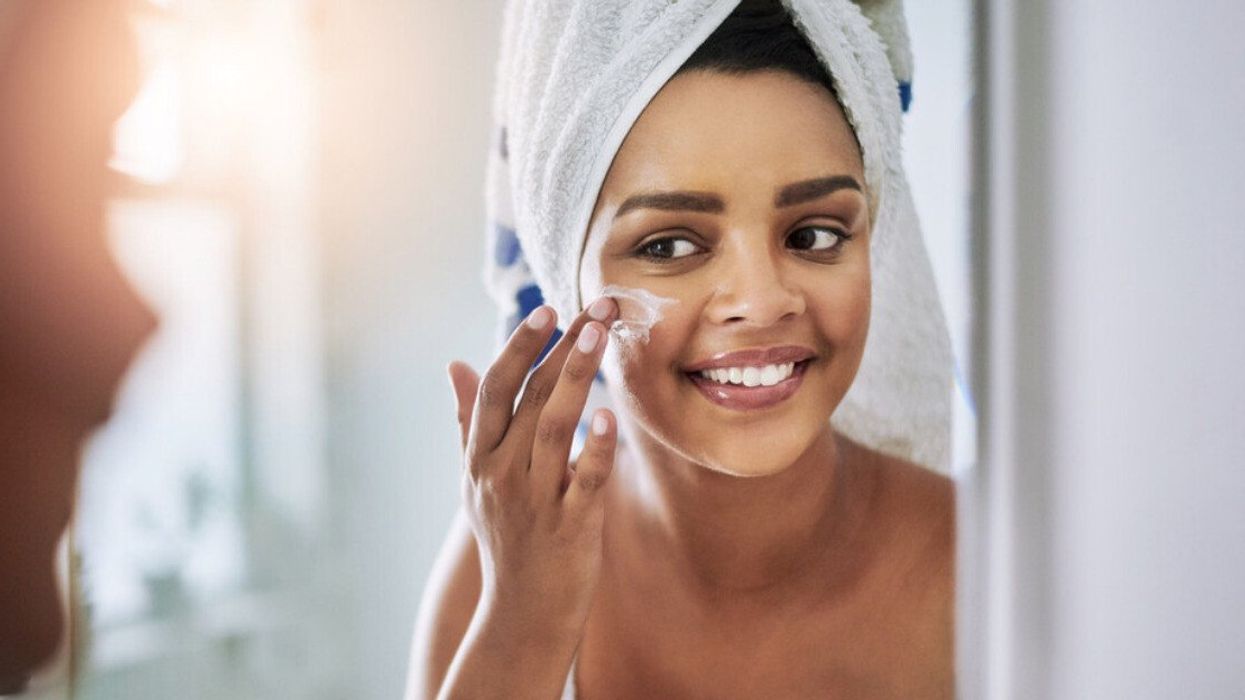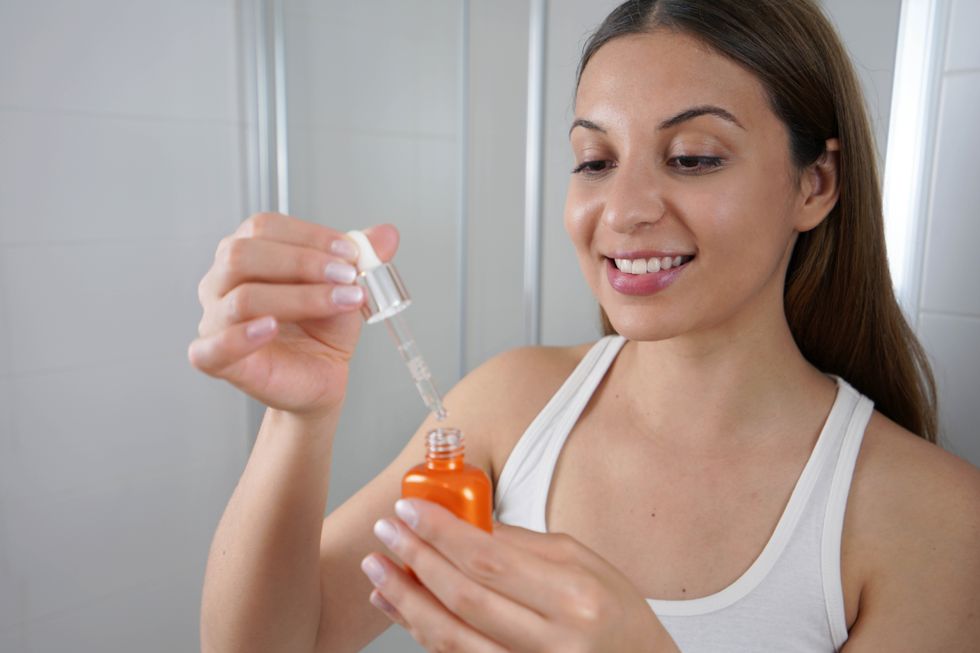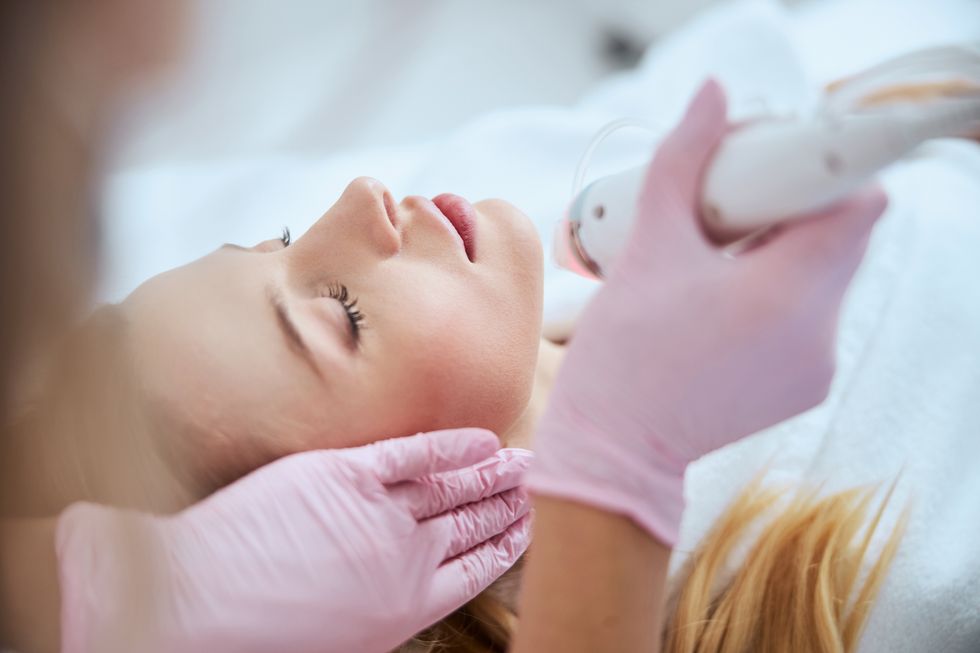It's Officially Summer In Canada & Here's Why You Should Be Switching Up Your Skincare Routine
A dermatologist gave some top tips. ☀️

A woman applying moisturizer to her face.
Summer is officially here and that means it may be time to update your daily skincare regimen.
As the seasons change, our skincare routine needs to adapt as well, and there are certain ways we can help our skin adjust to the heat and humidity over the next several months.
It's not just skincare products we should be mindful of, but certain skin procedures as well.
Dr. Julia Tzu, a surgical, laser and cosmetic dermatologist based in Manhattan tells Narcity that "one set routine" doesn't work regardless of the time of year.
"During every season you should be switching up your skincare to suit the kind of changing environment," she added.
So what is it in our skincare regimen that needs to change?
Here are Dr. Tzu's top tips on how to change your skincare routine for the summer.
Sunscreen, sunscreen, sunscreen!
When summer comes around, Tzu says the first thing you should be thinking about is using sunscreen due to the increase in UV radiation and higher temperatures.
"You've got to wear sunscreen, you got to amp up the SPF, make sure your SPF is broad spectrum and make sure it's non-comedogenic when it's used on your face," Tzu advised.
"That's the top priority when it comes to summer skincare."
The dermatologist also stresses that you need to use sunscreen regardless of whether you have fair skin or darker skin.
She also recommends using a lip gloss or balm with SPF in it to protect your lips.
Also, don't forget to reapply the sunscreen if you're spending hours outside.
Many people may also assume that a higher SPF means they can skip that step, but that's not the case.
Dr. Lisa Kellett, a dermatologist in Toronto, says it all comes down to science, and unfortunately, many people misunderstand what SPF truly means.
"SPF of 60 does not protect you twice as much as an SPF of 30," she told Narcity in an interview. "Nothing completely will protect you."
The Skin Cancer Foundation recommends sunscreen with SPF of 15 or higher if you're inside for majority of the day or outside for short periods of time. However, if you'll be spending a lot of time outside, you should be using an SPF of 30 or higher, water-resistant sunscreen.
It's also important to choose a sunscreen that protects against both UVA and UVB rays.
Exfoliate more frequently
If you've steered clear from exfoliators over the winter, Tzu says summer is the time to start as your body sweats and produces more oil.
"Some people who generally can't tolerate exfoliation at all during the wintertime can probably start using it during the summertime because your skin is a little bit more hardy during the summertime. It's hotter, it's warmer, it's more humid," she continued.
As for those who do exfoliate during the winter, Tzu says they can increase their frequency.
The dermatologist says your skin can handle more irritants, like exfoliants, during the summer because of the heat and humidity.
"The humidity restores your skin barrier a little bit more so you can exfoliate a little bit more frequently," she explained.
Use a Vitamin C serum to reduce dark spots

A woman applying vitamin C serum to her face.
Tzu says she recommends to her patients that they use a Vitamin C serum during their morning routine in the summer months.
This can help reduce brown spots on the skin.
"Especially for people who are prone to discolouration with sun exposure," she noted.
"To some level, it can protect you against things like brown spots, which a lot of people hate."
Change your moisturizer
Our skin tends to be more dry in the winter so we end up using thicker creams. However, now is the time to do the opposite.
Of course, it does depend on your skin type and what you do in the wintertime.
So if you use a thick moisturizer in the winter, you'll want to find a lighter formula for the summer.
Tzu says moisturizer is especially necessary at nighttime to replenish the skin.
"You're kind of recharging yourself when you're sleeping, you're recharging your skin as well," she explained.
"An eye cream and a neck cream, I think they're nice to have but if you really just wanted to stick with the very basics you could just use your facial moisturizer and moisturize right under your eyes and also your neck."
Retinoids can be used more frequently during the summer, but be careful
Just like with exfoliants, Tzu says if you use retinoid year-round, you can increase the frequency during the summer.
"The basic principle [is] irritants can be increased during the summertime, irritants must be decreased during the wintertime and protectants, things like moisturizers, can be decreased during the summertime [and] protectants can be increased during the wintertime."
According to the American Academy of Dermatology Association, a retinoid is a "catch-all for an array of vitamin A-based products used on skin." It's typically recommended for someone with mild acne or pigmentation issues or for mild fine lines and wrinkles.
One thing to be mindful of, Tzu says, is that products like retinoids or over-the-counter topical benzoyl peroxide products do make your skin more sensitive to the sun.
This is why sunscreen and other sun protection are so important.
Tzu says if you do use retinoid once a day, use it before going to bed rather than in the morning.
What products and skin procedures should you avoid in the summer?

A woman getting a micro-needling treatment done.
Viacheslav Iacobchuk | Dreamstime
While there's nothing she would say needs to be completely avoided during the summer, Tzu does stress that people need to be careful when it comes to certain procedures.
The procedures include anything with lasers or micro-needling because they penetrate the upper layer of your skin.
What that does is it makes your skin more sensitive to the sun and can cause hyperpigmentation in the area where the treatment was done.
If you know you'll be outside a lot during the summer then that may be a skin procedure you leave until the fall, winter or spring.
"It's hard for people to really minimize sun exposure during the summertime enough to prevent the complications of hyperpigmentation from a procedure," she said.
This article's cover image was used for illustrative purposes only.
This interview has been condensed and edited for clarity.